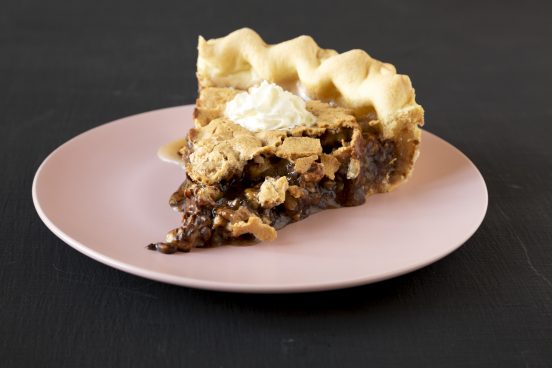Folks in Louisville already know this, but the rest of the world might be surprised – DERBY-PIE is a registered trademark. Not only is it a registered trademark, the owner of that trademark, Mr. Alan Rupp, is known to be a vigorous enforcer of his rights.

Chocolate-Walnut Pie, not from the Melrose Inn.
All things Derby
This is the end of Derby Week in Louisville, the lead up to the Kentucky Derby®, the most famous horse race in the world and The Most Exciting Two Minutes in Sports®. In any normal year, Derby Week is a joyous occasion with hundreds of thousands of people in close proximity, drinking mint juleps, listening to music, seeing an occasional horse, and eating a delicious chocolate and walnut pie in a light and flaky crust. This, of course, is not a normal year. The original recipe for this pie was developed in 1954 at the Melrose Inn in Prospect, Kentucky, called the DERBY-PIE, and the trademark was born.
The Lawsuit
The latest lawsuit from Mr. Rupp was against the Louisville-Courier, the local newspaper. The day of the Kentucky Derby 2017, according to the opinion,
Defendant [the Louisville Courier Journal] published an article (“Article 1”) with the headline, “Bourbon makes this Derby pie a state original.” . . . In the article, Defendant provided the recipe—courtesy of the “fine folks up rivers at Captain’s Quarters—for a “Derby chocolate-walnut pie …
In June 2017, Defendant published an article (“Article 2”) about Derby City Macarons, an independent, locally owned shop specializing in macrons, the “French almond flour pastry.” Below a photograph of assorted macarons, Defendant wrote: “Derby Pie, Mint Julep and Peach Tea macarons from Derby City Macarons …
No Trademark Use, No Infringement
The Louisville Courier brought a motion to dismiss. The newspaper argued that it’s use of “Derby Pie” in the articles was not trademark use, as it was merely reporting on the availability of the pie at Captain’s Quarters and a flavored pastry at Derby City Macarons. Trademark use requires the trademark to indicate sponsorship or a connection to the goods and services in question. In this case, those “goods” would be the Melrose Inn’s pie. According to the Court:
[B]oth Articles explicitly and repeatedly identify the source of the product as being other than DERBY-PIE®…. In Article 1, “Chocolate-walnut bourbon pie from Captain’s Quarters” identifies the source of the recipe as Captain’s Quarters, not DERBY-PIE®. Moreover, the headline, “Bourbon makes this Derby pie a state original,” uses “Derby” to modify “pie,” not to identify the source of the product as DERBY-PIE®. This is analogous to using “Derby” to modify “horse,” “hat,” or “party” and does not constitute an impermissible use of the Mark.
“[A] party does not violate trademark law solely by using words another entity has trademarked[.]” …. Because bourbon is not an ingredient in DERBY-PIE®, Defendant’s use of the word “Bourbon” in the headline also indicates that this is not a recipe for DERBY-PIE®. A reader of Article 1 would not think that Defendant, a newspaper, produced DERBY-PIE®.
The Louisville-Courier invited the court to extend Rogers v. Grimaldi to all newsgathering efforts. That Second Circuit Court of Appeals case essentially provides that any artistic use of a trademark is protected by the First Amendment and is not actionable as infringement. The court in the DERBY-PIE case declined to extend that holding to all journalistic endeavors, however. It seems that it remains possible that a newspaper could infringe a trademark in a story. But this time they didn’t.
My Take
I’m not convinced that the fact that there is bourbon in the Captain’s Quarters’ “Derby” pie has anything to do with whether there is trademark infringement in calling it a “Derby” pie. Mr. Rupp’s problem, however, is that if there is a claim to be made there, it’s against the restaurant, not against the newspaper reporting about it.
Enjoy your Chocolate-Walnut Pie and your Mint Juleps* this weekend, that is if you can get to the grocery store safely. You’ll just have to do it without live horses.
*“Mint Julep” is not a registered trademark for cocktails, although it is for facial scrubs and shrubbery.

